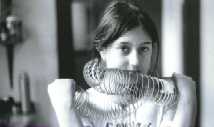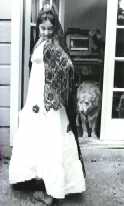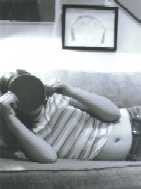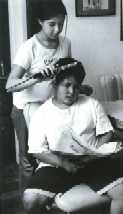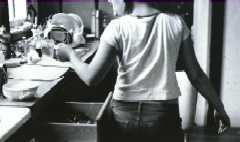
|
home |
|
Sharing Talia Coming to Terms with My Daughter's Father A man and I made a person. Earlier, much earlier, the man and I—his name is Lee—are simply another couple. We're in our mid-20s. We ride Muni buses together through San Francisco's rain-slicked streets. We buy platters of ham and cheese and French bread and return to his refrigerator-sized apartment and eat in front of the Monday night football game. I spend my days knocking on suburban front doors, canvassing people for money for vague but important environmental causes. Most nights Lee drives his cab, but sometimes he plays music and on those nights I sit at bars and watch stage lights play over his brown curls. The lights make shadows below his hazel eyes. He stares intently at his long, narrow fingers as they pull sound from his guitar. After six months of even-keeled relationship, we split. There doesn't seem to be enough emotion between us to hold us together. That's my take on it, anyway; we never talk enough to figure it out. I'm not sure we ever really talked at all. Later, months later, I'm an usher at the Cirque du Soleil. Every night I watch the contortionists lie, stomach down, on a mat on the floor and flip their legs over their heads, until they're looking at the audience through their feet. I watch the short Russian man with a wrestler's build climb a tower of teetering chairs more than 20 feet high. Another usher at the circus, a thin man with dirty blond hair, asks me out for a drink and I acquiesce. We ride our bikes through deserted South of Market streets, slick with night dew, to the Hotel Utah. This was when there were still deer heads on the wall, with glass eyes that are said to have seen Joe DiMaggio and Marilyn Monroe lean their heads together at the bar. Lee is there, at the Hotel Utah. We just missed his set. Hugging him, I feel his strength. He feels much more substantial than the dirty-blond usher appears to be. I ask Lee to give me and my bicycle a ride home in his cab. I don't intend anything to happen between us. Two months later, I pee on a stick that turns pink with a certainty that's impossible to ignore. Lee and I are now in that small percentage of people who use birth control only to have it fail. Lee and I talk about abortion—he assumes abortion—but something stops me. I don't want an abortion. I choose to abdicate my right to choose. Lee says your choice, your child, goodbye. We don't talk again for seven months. Seven months of mental introspection and physical expansion, of magic and fear and loneliness. I work at an office in the Mission District, processing words on a computer. When I walk home at the end of the day, I buy food at the Busy Bee Market and cook it in my small, one-bedroom flat. My bed is a futon on the floor, and I sit on it and eat a lot of Häagen-Dazs coffee ice cream and watch re-runs of "M*A*S*H," and worry that the coffee in the ice cream is bad for the baby. A few hours after my daughter's birth, I feel compelled to call. I must tell Lee that a being, a soul of deep dark eyes and crinkly red face, ugly and wise and gorgeous, is here, now. He needs to know this, no matter how he feels about me or I feel about him. His response is to fling his fear at me, swinging as hard and fast as he can. "Get the fuck out of my life. You're ruining my life. Don't ever call me again." Click. His anger and fear slide down the phone line into me, into a narrow hollow between my lungs and my rib cage, exactly at the mid-point of my chest. I hang up the phone, blink fast, and bear down hard on my emotions. Two years later, a person is busy growing up next to me, around me, on top of me, covering me with sticky, chubby fingers and rosebud kisses. When I bend down to hug her, her short arms can't reach around me so they rest on my shoulders, and she sometimes gently taps me there, as though to reassure me. Then the dad changes his mind. He chooses to change. His choice, his child. He becomes a one-day-a-week dad. She doesn't like him. She cries every time I walk away. It takes all my strength to keep walking, and I yearn for someone to tell me it would be okay for me to keep them apart. I tell myself it will get better, once she gets to know him, and it does. Eventually there is less crying. The three of us interact one day a week in a shallow, somnambulistic sort of way. When she is with him, I rush headlong into infinite errands, not stopping to breathe until he brings her back to me. I don't think he is good for her—he doesn't care for her as much as I do—but I cannot bear to think this. Years pass, and Lee meets Maya. Maya imbues Lee with a gentler sort of spirit. He's more like a dad now. But I struggle with their increasing desire to be parents. They volunteer at growing person's school; they go on weekly field trips. At the playground, Maya's cascading hair is twisted lovingly into silky braids by adoring girls. Maya, I imagine, laughs lightly, slightly peeved but willing to play, as much as anyone can play in a short skirt and high heels. I hate that my daughter's role model at daddy's house is sexy and feminine. I hate that my hate makes me look like a jealous ex-lover. I hate that I care what I look like. I hate that Maya and Lee know nothing but play with small growing person with whom I love to play, while I know dirty dishes, tangled hair, the sting of the novocaine shot, and the writhing twisting agony of stomach cramps as we speed to her first day of first grade when we both want to stay home and play, together. I hate that they take her to the Japanese tea garden and the beach and to feed the ducks, all the places I want to take her but never have the time. I think most of all I hate that their house is always clean. Eleven years have passed since I watched that little white stick turn pink. I don't have to bend down to hug growing person, and her arms reach all the way around me now. Lee and I have never talked about the past, about the night we made a person, or about his words to me the day she was born. But lately I've begun to realize why my house is dirty. It's dirty because growing person and I discovered you can play Twister with just two people. And it's dirty because this morning she and I contemplated the mythical life of Athena as we stalled our way through breakfast, and then I didn't have time to do the dishes. And it's because, on a whim one night, we went for a jog at 10 P.M. instead of putting the paper dolls away. My house is dirty because of those late-night chats in bed when she's supposed to be asleep and I'm supposed to be vacuuming. And it's dirty because there is no way I'm going to clean while she gets to watch the original version of Doctor Dolittle. When I think about it, Maya and Lee can live in their pristine house with the retro furniture, the white shag rug. They can play at mommy and daddy, trimming her fingernails, buying her shoes. Growing person can enjoy them, and they can enjoy her. And then they can bring her home.
Andrea Coombes is a freelance writer living in San Francisco. She and her 11-year-old daughter, Talia, often go for a bike ride when the stack of dishes in the sink gets too high.
| |||||||||||||||||||||
